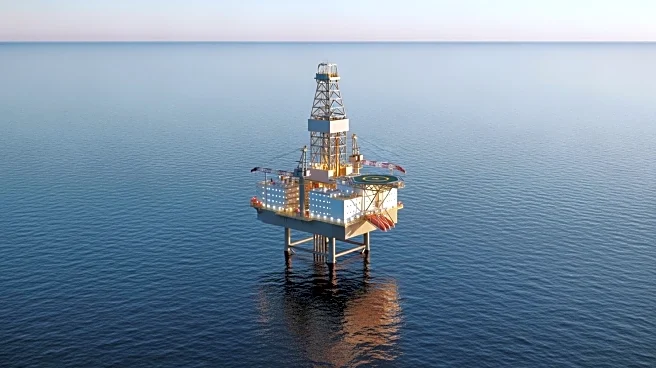What's Happening?
The Trump administration is preparing a proposal to open nearly all U.S. coastal waters to new offshore oil drilling. This move comes despite opposition from state governors and previous efforts by President
Trump to restrict such activities in certain areas. The draft plan, developed by the Interior Department's Bureau of Ocean Energy Management, suggests potential auctions for oil and gas drilling rights along the U.S. East and West coasts, as well as in the Gulf of Mexico and near Alaska. The proposal marks a significant expansion of U.S. territory targeted for oil and gas leasing, including areas near coral reefs and Arctic waters. Environmentalists have criticized the plan, citing risks to coastal communities and marine habitats.
Why It's Important?
The proposed expansion of offshore drilling could have significant implications for U.S. energy policy and environmental protection. If implemented, it would represent a major shift towards increasing domestic fossil fuel production, aligning with President Trump's energy agenda. However, the plan faces strong opposition from environmental groups and several coastal states, which fear the potential for oil spills and damage to tourism-dependent economies. The proposal also highlights ongoing tensions between federal energy policies and state-level environmental concerns. The outcome of this initiative could influence future U.S. energy strategies and environmental regulations.
What's Next?
The draft proposal is an initial step in creating a new five-year plan for selling Outer Continental Shelf oil leases from 2026 to 2031. The plan will undergo public and congressional scrutiny, with potential revisions based on feedback from stakeholders. Coastal states, particularly those opposed to new offshore drilling, are expected to play a significant role in shaping the final version of the plan. The process will involve consultations with state governments, and the final decision will likely reflect a balance between federal energy goals and state environmental priorities.
Beyond the Headlines
The proposal underscores the broader debate over the U.S.'s energy future, balancing fossil fuel development with environmental sustainability. It raises questions about the long-term impacts of increased offshore drilling on marine ecosystems and climate change. Additionally, the plan could set a precedent for future administrations regarding federal versus state control over natural resource management. The outcome may also affect international perceptions of U.S. commitment to environmental protection and climate change mitigation.









